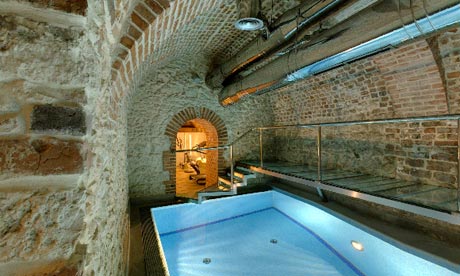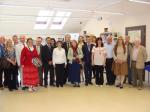Museum of Contemporary Art in Krakow (Mocak)
One entrance carries the glittering sign, “Kunst macht frei” (art makes you free). The pun is not arbitrary. The museum, designed by Italian architect Claudio Nardi, has been built on the site of Oskar Schindler’s factory in the city’s post-industrial Zablocie district, retaining one of the original walls and adapting six other buildings. The History Museum’s Story of Nazi Occupation is also on-site.
There are glass floors, complex walkways, slanting roofs with skylights. The warehouse atmosphere (which, in the basement, can feel like an underground car park) is broken up by cubby holes, intimate film rooms, video-boxes and a lively mix of genres.
• Ulica Lipowa 4, +48 12 263 40 00, mocak.com.pl/en, £1.90 (free on Tues), children under seven free. Open Tues-Sun 11am-7pm
Ulica Kanonicza
 Photograph: James Howard
Photograph: James Howard
My favourite street in Krakow, a cobbled lane of 14th-century townhouses leading to the Wawel Castle, is beautiful by day or night. There’s the Kawiarnia Literacka (Literary Cafe) at No 1, an old-school subterranean cafe and a former haunt of writers during communist times. Next door is the Cricot Theatre, Tadeusz Kantor’s avantgarde theatre (tinyurl.com/cricottheatre). Walk among the eerie machines and mannequins of this subversive director’s work. At No 11, you’ll find Bona: Books and Coffee, with a selection of Polish books translated into English (bonamedia.pl). Before you reach the castle, don’t forget the house where Pope John Paul II lived when he was Archbishop of Krakow (1951-67).
The Jewish district of Kazimierz
 No-BoNo-Bo (Ulica Meiselsa 24, restauracja-nobo.pl) is a new 50s-style cafe-diner with film posters, good coffee, daily specials from 17zl (£3.30) and a wide-ranging menu including breakfasts both English and Polish. Next door you’ll find the delightful Mleczarnia, a former Jewish milk bar, with an interior of gramophones and candelabras and sepia photographs. There’s a lovely garden opposite, one of the best spots in the city when the chestnut and cherry trees are in full bloom.
No-BoNo-Bo (Ulica Meiselsa 24, restauracja-nobo.pl) is a new 50s-style cafe-diner with film posters, good coffee, daily specials from 17zl (£3.30) and a wide-ranging menu including breakfasts both English and Polish. Next door you’ll find the delightful Mleczarnia, a former Jewish milk bar, with an interior of gramophones and candelabras and sepia photographs. There’s a lovely garden opposite, one of the best spots in the city when the chestnut and cherry trees are in full bloom.
Ulica Józefa, Kazimierz

Love Krove. Photograph: glodnawrazen.com.pl.
This is a fascinating street of antique shops (starocie) and offbeat boutiques including, No 20, Butik (ideafix.pl), which features only Polish designers. At No 8 Love Krove (facebook.com/lovekrove) is an almost unbearably trendy burger joint for hungry hipsters. Choose from a dozen burgers (£3.20-£6), and squeeze between the brightly coloured furnishings, the chunky spectacles and those angular hair-dos-and-don’ts. Still, it’s a first for Krakow.
For cafe-bars, find a cushioned nook in the small, rambling rooms of Eszewaria (No 9), or cross the road to sister bar Esze (No 18), my retreat of choice, with its low-slung armchairs, old sofas and lamps, drums as tables, swing-seats at the bar, and a real fireplace and smoking room. There’s Fairtrade coffee, and – a trend at the moment – unpasteurised Polish beers such as Perla and Ciechan.
Warning: Ulica Józefa Nos 8-13 (including Eszewaria) will close in the not-too-distant future as the buildings are owned by the church and they want to build … a hotel!
Accommodation
 Hotel CopernicusSodispar (sodispar.pl) is a friendly agency renting basic twin-bed studios for 150zl (£30) or luxury apartments for up to 10 people for 490zl (£98). Its old town flats are on the best streets, within walking distance of the main square, and for my zloty, the best value for kipping in Krakow. Repeat guests are rewarded with a 20% discount, and the website carries last-minute offers.
Hotel CopernicusSodispar (sodispar.pl) is a friendly agency renting basic twin-bed studios for 150zl (£30) or luxury apartments for up to 10 people for 490zl (£98). Its old town flats are on the best streets, within walking distance of the main square, and for my zloty, the best value for kipping in Krakow. Repeat guests are rewarded with a 20% discount, and the website carries last-minute offers.
For those looking to the stars, the Hotel Copernicus (Ulica Kanonicza 16, hotel.com.pl, doubles from £85) is a consummately stylish hotel named after the Polish mathematician-astronomer Mikolaj Kopernik, who studied in the city. The Copernicus is the sister hotel of the Stary (staryhotel.com, doubles from £175), where the England team will be staying, but offers a much quieter spot beneath Wawel Castle, a suite with a restored 15th-century fresco and a dining room with a 16th-century wooden ceiling, plus 29 sophisticated rooms of dark oak and leather. A swimming pool in the medieval cellar completes the elegance.
Podgórze
 Pódgoerze Bridge. Photograph: James Howard
Pódgoerze Bridge. Photograph: James Howard
Podgórze is a working-class area being revitalised by bohos fleeing the tourist-flooded centre and Jewish district. The recent Laetus Bernatek footbridge (named after a local monk) has opened up previously dark and dangerous areas both sides of the river.
Drukarnia (Ulica Nadwislanska 1, drukarniaclub.pl/english.htm) is a happening venue, ideal for enjoying sunsets over the River Wisla. The cafe-club has a basement for concerts and DJ nights, a saloon-style smoking room and a smarter side with velvet seats, a long bar and huge windows on the river.
A tower block behind sports work by the famous Italian graffiti artist Blu. Back on the other side of the bridge, there’s Cocon gay club (Ulica Gazowa 21); the owner, Janusz, once worked for Radio Free Europe.
Underneath Cocon, you’ll find the Teatr Nowy (teatrnowy.com.pl) patronised by the transsexual MP Anna Grodzka, and currently running an adaptation of Michal Witkowski’s Lovetown, a funny and ribald look at gay life in Poland. Round the corner, there are two new cafes as you approach the bridge from the city side: Mostowy Art Cafe (Ulica Mostowa 8) is a large and elegant gallery cafe, while Po Drodze (“on the way”), next door, offers a cosy old kitchen feel in which you can take your coffee with a vodka shot.
Restaurants and bakeries
 Pod Baranem, Krakow
Pod Baranem, Krakow
Though Wentzl (Rynek Glowny 19, restauracja.wentzl.pl/eng/indexeng.html) is still prospering after more than 200 years of superior dining, my current favourite is Pod Baranem (Ulica Sw. Gertrudy 21, podbaranem.com/english.html), a father-and-son-run enterprise, frequented by Polish presidents, painters and poets, who sit beneath paintings by the leading contemporary artist Edward Dwurnik. It’s quiet and low-lit, serving the very highest quality Polish food: hunter’s stew, homemade pork sausages, pork jelly, venison pâté with Cumberland sauce. Also try piernik ginger cake with coffee butter and cherry vodka, followed by a shot of homemade walnut vodka. What’s more, the male-only staff have all attended waiters’ school, making the service attentive and friendly – a rare treat in Poland. The lunch menu is a mere 18zl (less than £4) an evening meal from around £10 per head plus drinks.
Krakow chatter is of the Gessler Restaurant, a new sensation at the otherwise outmoded Hotel Francuski (Ulica Pijarska 13). A famous Warsaw TV chef, Adam Gessler, has moved to the city to revitalise this old hotel’s kitchen. The results have been dramatic, turning a previously empty restaurant into a spot very popular with those in the know, not surprising at 20zl (£4, double that for evening) a pop for a lunch menu of, for example, pea soup, veal cutlet and dessert.
Krakow is a ciasto-miasto, a cake city. Cupcake Corner (Ulica Bracka 4,cupcakecorner.pl) has daily variations of coffee and cupcakes, from carrot to liquorice. The Michalscy Cukiernia (michalscy.pl) cake shops are probably best value and you can find them all over the city, serving up the calorie-clocking Polish delicacies of szarlotkaapple cake, sernik cheesecake and 10cm-tall towers of pink cream sandwiched in flaky pastry.
Festivals

Zadie Smith, Milosz festival. Photograph: Tomasz Wiech
Small wonder the city is applying for status as a Unesco City of Literature. Krakow hosts the Milosz Festival in May (milosz365.eu), and the Conrad Festival in November (conradfestival.pl/en). Milosz is one of the city’s two Nobel prize winners for literature, whereas Joseph Conrad spent his childhood years in the city.
I’d also recommend the Sacrum Profanum (sacrumprofanum.com/en), Film (kff.com.pl/en), and Off Kamera (offpluscamera.com) festivals. The city is very proud of its new Opera House (opera.krakow.pl/otwarcie_en.php), whereas Nowa Huta, a communist-era workers’ district, has a nascent arts scene, including the theatre/venue Laznia Nowa (laznianowa.pl/laznianowa/index.php/en). Check out the Coke Live Festival in August (livefestival.pl/en) and the Selektor Festival in June (selectorfestival.pl/news_en.html) for live music with increasingly impressive line-ups.
Bar-clubs
 Ambasada Sledzia
Ambasada Sledzia
Ambasada Sledzia (“The Herring Embassy”, Ulica Stolarska 8-10,tinyurl.com/ambasada) is so named as it’s opposite the American Embassy, so you get a 24-hour police guard to go with your drinking. Non-pasteurised Kasztelan beer, a glass of wine and a shot of vodka are all at 4zl (80p). “Polish tapas” means cheap sandwiches and soups, plus herring in oil, sour cream or beetroot. Herring is known to go well with vodka, hence the Polish saying, “a fish likes to swim”.
The bar-club Rozrywki Trzy (Ulica Mikolajska 3, tinyurl.com/rozrywki), run by the owners of the legendary Piekny Pies (piekny-pies.pl), has an underground dancefloor, and hosts gigs and film nights.
Adventurous types should seek out Literki (“letters”, Ulica Berka Joselewicka 21), down a dark side street a 10-minute walk from the centre, and behind a metal door, with a roster stretching from jazz jams to “dubstep & grime” nights. You have to keep your ear to the ground to find out what’s going on in this place.
Walks and wanderings

The Planty. Photograph: Alamy
You must walk the chestnut-lined strip of gardens, known as Planty, that circles the city alongside the old walls. It’s a lovely walk all year round and a great way to see local history and people alike. In the centre, wander along Sw. Marka and Sw. Tomasza streets, browsing small galleries (Sw. Tomasza 22, galeriafotografii.eu), antiquarian bookshops and many fine churches, before heading to one of Krakow’s best-kept secrets, the roof-cafe of the Music Academy (Sw. Tomasza 43) for unrivalled views of the city. Only don’t tell anyone I told you.
James Hopkin is the author of Winter Under Water and the award-winning short story Even the Crows Say Krakow (Picador, £1.99,tinyurl.com/eventhecrows). His Dalmatian trilogy of short stories will be broadcast on BBC Radio 4 on 1, 8 and 15 January at 7.45pm.


 when I was invited to give a reading from my
when I was invited to give a reading from my 


 Gabriela Adamesteanu is, in her turn, well-known for her non-fictional review and article writing in the Romanian cultural press. When asked if her non-fiction writing sometimes blends into her fiction, she asserted that, even though the research for certain articles could work to the advantage of something she writes, the fictional worlds stand alone, uniquely anchored in the imagination, no palpable reality strings attached.
Gabriela Adamesteanu is, in her turn, well-known for her non-fictional review and article writing in the Romanian cultural press. When asked if her non-fiction writing sometimes blends into her fiction, she asserted that, even though the research for certain articles could work to the advantage of something she writes, the fictional worlds stand alone, uniquely anchored in the imagination, no palpable reality strings attached.








Recent Comments